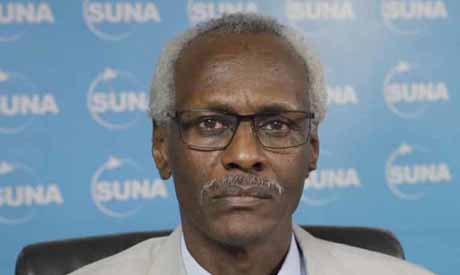
Sudan Minister of Irrigation and Water Resources Yasser Abbas
Sudan has decided not to take part in the tripartite ministerial meeting on the Grand Ethiopian Renaissance Dam (GERD), which is scheduled for later on Saturday, saying that the way previous talks were held proved to be "unproductive", Sudan News Agency (SUNA) reported on Saturday.
In a message to Ethiopia’s Irrigation Minister Seleshi Bekele, Sudan’s Irrigation Minister Yasser Abbas has reiterated his country’s previous stances, calling for involving African Union (AU) experts to facilitate negotiations and bridge the gap between Cairo, Khartoum, and Addis Ababa, the Sudanese Ministry of Irrigation and Water Resources ministry said in a statement.
Abbas also stressed in his message to Bekele, according to SUNA, that the "method followed in negotiating during the past rounds has proven to be unproductive."
The Sudanese minister's message also reaffirmed Khartoum's adherence to the negotiation process under the auspices of the AU to reach a binding and satisfactory legal agreement for the three parties, in accordance with the principle of African solutions to African problems.
Saturday's scheduled meeting on GERD comes as an outcome to the previous six-member ministerial virtual meeting of the foreign and irrigation ministers of the three countries that was headed by the Minister of international relations and cooperation of South Africa Naledi Pandor.
Following Thursday's meeting, Egypt has expressed in a statement by the foreign ministry its aspiration to participate in the next round of GERD negotiations that “will be held during the next few days,” so as to reach a fair and balanced agreement that achieves the common interests of Cairo, Khartoum and Addis Ababa, and preserves their water rights.
According to a statement by the Ethiopian foreign ministry at the time, the next course of action in resuming the negotiations was discussed during Thursday's meeting, and concluded by reaching an understanding on the need to “continue the negotiations on the filling and annual operation rules of the GERD.”
While the Sudanese irrigation ministry said on Thursday that Pandor has concluded Thursday's meeting by calling to continue the negotiations for the next ten days, Khartoum objected to resuming the negotiations according to the previous approach.
Thursday's meeting came in response to a call from South Africa's foreign minister to discuss how to reach a mechanism to revive negotiations halted earlier in November.
On 4 November, which saw the latest round of the negotiations mediated by the AU, Egypt’s irrigation and water resources ministry said that it has become clear during that day's tripartite discussions on the Ethiopian dam that there is no compatibility between Egypt, Sudan, and Ethiopia on the methodology for completing the negotiations within the next stage.
The previous round of negotiations between Cairo, Khartoum, and Addis Ababa, mediated also by the AU, came to an end in August as a result of disagreements on the rules for filling and operating the hydropower project that culminated in non-binding guidelines proposed by Ethiopia, which were rejected by Egypt and Sudan, both of whom seek a legally binding agreement.
That AU-sponsored round of negotiations was launched in July after negotiations between the three countries reached a deadlock last year, as did negotiations sponsored by the US and the World Bank in February.
The GERD, built 15 kilometers from the Ethiopian border with Sudan, has been a source of contention between the three countries. Cairo that has more than 85 per cent of its Nile water flow from Ethiopian highlands fears the massive hydropower project will significantly diminish its crucial water supplies, which is already below scarcity level, while Sudan fears it could endanger the safety of its own dams.
Ethiopia says the 6,000-megawatt dam is key to its development and hopes to become Africa’s biggest electricity exporter with the GERD, which is set to be the continent’s largest dam.
Short link: